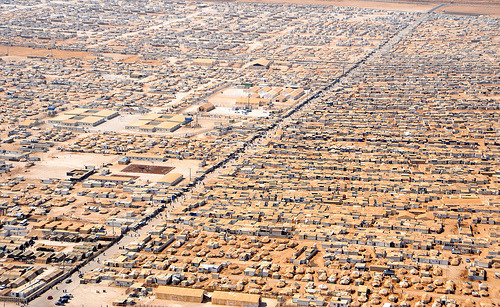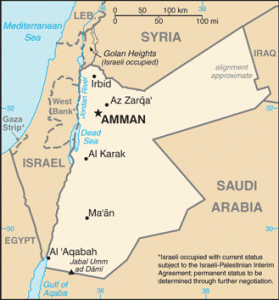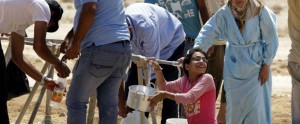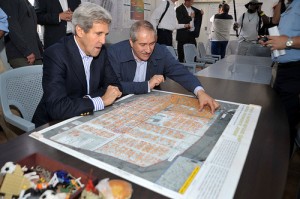
Easing Jordan’s Burden Requires a Targeted Aid Strategy
 As the debate over supplying aid to the Syrian opposition continues, Jordan, the welcoming neighbor to the south, moves further and further towards socio-economic crisis.
As the debate over supplying aid to the Syrian opposition continues, Jordan, the welcoming neighbor to the south, moves further and further towards socio-economic crisis.
A major Non-NATO U.S. ally and important regional partner, Jordan has a distinct history of accepting large populations of refugees from neighboring conflicts. The Syrian civil war has proven no different.
According to UNHRC, over 500,000 registered refugees have fled Syria into Jordan, although many Jordanians insist that that number is closer to 1 million, overwhelming rapidly erected camps and cities near the border. The Za’atri camp north of Al-Mafraq in Jordan hosts approximately 120,000 refugees according to UNICEF. However a large majority of the refugee population has chosen to make do in urban centers and local communities, putting enormous strain on Jordan’s already thin resources.
Prime Minister Abdullah Ensour stated in May that the Jordanian government alone has increased its deficit by $700 million to support the Syrian refugees, which does not include indirect pressure on health care, sanitation, and other public services.
Jordanians complain that Syrians have largely crowded out hospital space, as intakes have more than tripled, and previously eradicated diseases such as polio and tuberculosis have reappeared.
Especially in dryer northern cities, such as Irbid and Al-Mafraq where much of the Syrian refugees have settled, municipal distribution systems were already strained to provide enough water for Jordanian citizens. In response to the increased demand, officials have been forced to experiment with expensive desalinization projects and purchase water from private wells, adding to already soaring costs.
Jordan has not avoided many of the economic woes plaguing the region either, facing unemployment and low growth coupled with rising food and fuel costs. The influx of direct international aid to help cover the expenses of refugees has inflated prices for increasingly scarce resources beyond what many locals can afford.
The international community has pledged aid packages to directly assist the Jordanian government with expenses, including a $150 million promise from the World Bank and $200 million from the U.S. in addition to the annual aid package.
 However Jordan already faces critical deficit concerns outside of the refugee crisis as it attempts to reform both economically and politically.
However Jordan already faces critical deficit concerns outside of the refugee crisis as it attempts to reform both economically and politically.
Despite its apparent stability compared to the rest of the region, Jordan is no stranger to widespread demonstrations demanding political change.
Over the past two years, Jordanians have taken to the streets to protest corruption and an entrenched bureaucracy that they feel has plagued government efficacy. While some demonstrators have called directly for King Abdullah II to step down and dissolve the monarchy (mostly after the November, 2012 decision to cut fuel subsidies), many have recognized the King’s genuine commitment to gradual and peaceful reforms.
He has confronted many of the elite attempting to limit political liberalization and increased participation.
The government has also tackled the issue of unsustainable fuel subsidies, an obstacle that has consistently hindered Egyptian officials. By cutting subsidies and easing the burden on middle and lower income families with cash transfers, the Treasury has saved approximately $707 million. Although initially unpopular, anger has since cooled as the population is weaned off subsidy dependence.
In addition to these reforms, the general economy has somewhat improved, with modest growth increases, unemployment hovering around 12.5% after a 15.3% high in 2002, and stabilized reserves.
However these successes will not continue if refugee expenses continue to burden the Jordanian treasury as they have. The gradual reforms undertaken by the government must continue in a stable manner, yet growing economic pressures and social tensions could shatter the fragile developments already achieved.
U.S. officials need to develop skill-transfer programs that focus specifically on solving Jordanian public service crises without jeopardizing current reform initiatives. While international attention has fixated on the plight of refugees, accruing large amounts of vital aid, similar attention must be directed towards Jordan’s diminishing resources for managing the influx. Secretary Kerry’s recent trip to Za’atri generated important publicity for the camp’s needs, and U.S. officials must work with other global partners to extend this exposure to Jordanian needs as well. Aid funneled directly to refugee camps does not reach many of the 70% of Syrians living in towns or cities.
A foreign aid strategy such as this does not advocate simply transferring funds for solvency’s sake, but rather providing skills and institutional framework to tackle fundamental issues impeding reform. Jordan has consistently been an important regional ally and security partner, and heightened instability poses a considerable risk to that partnership.
The U.S. must recognize that one of the most significant threats posed by the Syrian conflict rests in its impact on Jordan.








[…] Easing Jordan’s burden requires a targeted aid strategy […]